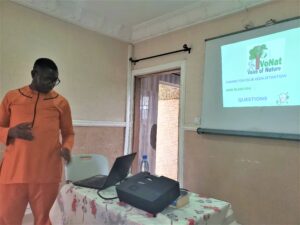A Cameroon-based environment and humanitarian non-profit organization, Voice of Nature (VoNat), has entreated graduates in environmental science, agriculture, journalism/communication, and sociology amongst others, to use the knowledge acquired in school in solving societal and environmental problems in their communities. This call was made during a 1-day seminar, which took place October 11, 2020, in Buea, organized by VoNat.

Aimed at enlightening university graduates in Buea and environs on how they can use the skills and acknowledge acquired from university in their respective field to solving societal and environmental problems, participants were enlightened on the missing link between the knowledge/skills and the solving of problems.
The graduates and youths from other walks of life, were also briefed on how they can gainfully deploy the skills and knowledge acquired during their training in the university to filling in this gap. They were also schooled on the advantages and opportunities that lie in solving societal and environmental problems in their communities.

Participants left the hall motivated to make a difference. “Solving societal and environmental problems is paramount; if we can actually use our skills and knowledge in identifying and solving the problems in the society, I think we are going to create a lot of impact,” said madam Asaba Lynda, a Buea-based environmentalist.

Mr. Njebu Mitchell just like other participants, saw how useful they will be to humanity, if they use their skills/knowledge to identifying and solving societal and environmental problems. “After following the presentation, I must say there is need for a new move. I really think that we will be more useful to humanity by being part of the solution to the problems in our society,” he divulged.
With the determination to make a difference, VoNat promised to train and mentor the graduates to practically identify and proffer solutions to societal and environmental problems in their communities.








We must protect our environment. Together we shall get there
I am regular visitor, how are you everybody? This piece of writing posted at this site is in fact nice. Orelia Earvin Rolph